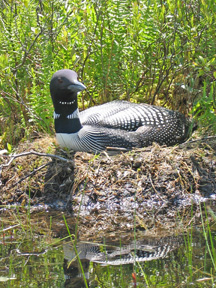Moving loons change their tunes
By Krishna Ramanujan

Bird experts believed for years that once a bird learned songs, the calls stayed relatively fixed for life. But a new Cornell University study finds that male loons change their tunes when they move into a new territory.
The study, to be published in the March issue of the international publication Animal Behaviour, reports that while female loons usually disperse over a wide area when ready to breed, males tend to stake claim to a small lake or section of a larger lake near where they were hatched. But rivals often challenge resident males and fight for the territory and the females. The fights can be to the death, with males diving and rising up under a foe in an effort to spear a rival through the chest and heart with his long, pointed beak.
It turns out that the victor gets more than the female -- he gets a new voice: He changes his vocalization, called a yodel, to a new call that is very different from the loser's yodel.
"It's as if they are trying to say, 'I'm the new boy on the block,'" said the paper's lead author, Charles Walcott, professor of neurobiology and behavior at Cornell. "Why that should be important, we really don't know."
The researchers recorded 527 yodels of 16 male loons on 21 lakes at the Seney National Wildlife Refuge in Seney, Mich., and 3,107 yodels of 82 loons on 63 lakes near Rhinelander, Wis. All the birds were banded as part of well-studied populations.
Yodels of male loons are unique from their neighbors on other lakes and stay stable from year to year. But, of 13 male loons whose yodels were recorded before and after they changed territories, 12 substantially changed their yodels within two years, and the new resident's yodel changed in ways that increased its difference from that of the previous resident.
"This result implies that loons not only change their vocalizations as the birds change territory, but also that the new owner is familiar with the yodel of the resident that it replaces," said Walcott. And, nobody yet knows whether other species of birds also change their tunes when they move into a new territory.

Some biologists have advocated using sound as a way to identify specific birds, as opposed to netting and tagging birds, which may be traumatic. "But since the loons change their vocalizations, it means you can't do that," said Walcott.
The research provides valuable insights into the loon's social and territorial behavior, which has implications for conservation efforts, Walcott noted. With legs near the back of the body, these streamlined, fish-eating water birds are awkward and vulnerable on land, so they prefer to nest in swampy areas with easy access to deep water. But, as more people build houses along lake shores, the loon's swampy nesting habitats near the shores are increasingly replaced with lawns. As a result, people build nesting platforms for loons on the water. But the loons fight over the platforms, which has led in some areas to too much fighting and not enough breeding. Researchers now recognize the need to coordinate where and how many such platforms are put on a lake.
"By understanding the loons' social system, we can help people and loons live together," said Walcott.
The study was funded by the Whitehall Foundation, the New Hampshire Charitable Foundation, the National Science Foundation and Cornell. Co-author Walter Piper, a biologist at Chapman University, contributed the behavioral analysis while Walcott and graduate student Jay Mager focused on collecting and analyzing the acoustic data.
Media Contact
Get Cornell news delivered right to your inbox.
Subscribe